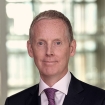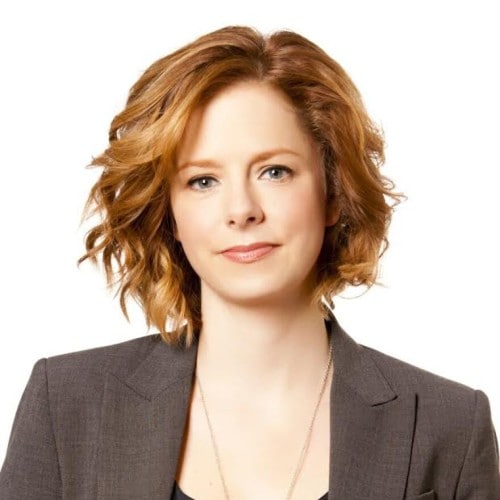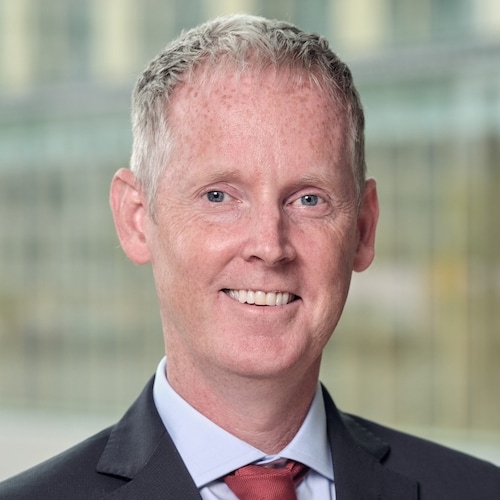{{item.title}}
{{item.text}}

{{item.text}}
Take on Tomorrow, the award-winning podcast from our management publication strategy+business, brings you Episode 12: “Can capital help solve climate change?”
Financial services are set to play a crucial role in creating a more sustainable economy and moving toward net zero. In fact, green initiatives involving trillions of dollars are already reconfiguring capital markets. But can this approach work? And will short-term losses be offset by longer-term gains? The transition isn’t just the right thing to do; it could create compelling business opportunities, too. In this episode, we discuss why one of the UK’s biggest banks is leading with purpose and prioritizing the fight against climate change, what that means in concrete terms, and what other businesses can learn from the decision.
Lizzie O’Leary
Podcaster and journalist
Ayesha Hazarika
Columnist and former senior political advisor
Alison Rose
Former CEO, NatWest Group
Andrew McDowell
Strategy& Partner, PwC Luxembourg
2023 Shorty award winner for "Best Branded Podcast" series
2023 Webby award nominee for "Best Podcast" series
{{item.text}}

{{item.text}}
As reinvention pressure rises, CEOs need to rewire their decision-making.
Sharp, actionable insights curated to help global leaders build trust and deliver sustained outcomes. Explore our latest content on the global issues affecting organisations today from ESG to value creation, technology and cyber to workforce transformation.
Alison Rose: Banks don’t deserve to exist unless they’re adding value and can add something to their customers. We support millions of businesses and millions of customers who every day are making choices that will affect the planet, will affect climate.
Andrew McDowell: The more the financial sector is willing to reduce the cost of capital for areas like clean energy, clean transportation, the more ambitious policymakers can become.
Ayesha Hazarika: From PwC’s management publication strategy and business, this is Take on Tomorrow, the podcast that brings together experts from around the globe to figure out what business could and should be doing to tackle some of the biggest issues facing the world.
I’m Ayesha Hazarika, a columnist and former senior political advisor in London.
Lizzie O’Leary: And I’m Lizzie O’Leary, a podcaster and journalist in New York.
In this episode, we’ll be talking about the role financial services should play in creating a more sustainable economy—both what’s happening now and what to expect in the future.
Ayesha: We’ll be speaking to Alison Rose, whose voice we heard at the start. Alison is the CEO of NatWest Group, one of the biggest lenders in the UK. She’ll tell us how NatWest is tackling these difficult issues through its approach to net zero in its own operations and in the way it decides which businesses to lend money to. She’ll also give us her thoughts on how businesses can manage the transition and make the shift as fair as possible.
Alison’s been with NatWest since 1992, when she started out as a graduate trainee. Her experience gives her a unique perspective on the bank’s transition to cleaner capital.
Lizzie: But before we hear Alison’s story, we’re joined by Andrew McDowell, a partner with PwC Luxembourg. He is an economist supporting Strategy&, PwC’s global strategy consulting business. Welcome, Andrew.
Andrew: Thank you, Lizzie. Thank you, Ayesha.
Lizzie: Andrew, we are talking today about the role of financial services in funding the net-zero transition. First off, can you explain what net zero is and why it’s important?
Andrew: Net zero means cutting greenhouse gas emissions to as close to zero as is possible. The reason why it’s so important is because the science is telling us that if we’re to avoid cataclysmic climate change, we need to limit the rise in temperatures to no more than 1.5 degrees above preindustrial levels. Now, already, we are at about 1.1 degree, on average, above preindustrial levels. In order to contain the growth in temperatures to 1.5 degrees, we need to reduce emissions to net zero by 2050. And along the way by about 45% by 2030.
Ayesha: Andrew, I can see why it really matters to society. But is it really an important question for the financial services industry?
Andrew: Yes, it definitely is. I mean the transition to net zero is one of the biggest challenges humankind has ever faced, and it’s going to involve, if we are to do it successfully, a complete transformation of how we—how we live, how we produce, how we consume, how we move about.
And this is highly relevant for the financial services sector. Resources will need to be mobilized for the massive amount of investment required to deliver net zero, to deliver the massive investment in renewable energy and clean energy, and clean transportation in energy efficiency, and in changing technologies underpinning most of what we do today.
Most of the physical capital stock in our economy—our buildings, our roads, our transport, our factories—are going to have to be replaced or at the very least adapted to deliver at the net-zero challenge. That’s going to involve investments by some estimates of about 125 trillion dollars between now and 2050.
Lizzie: And I wonder if you could explain what GFANZ is and why it’s important.
Andrew: Yeah. So GFANZ stands for the Glasgow Financial Alliance for Net Zero. It was launched in the lead-in to the meeting in Glasgow, the annual [2021] meeting of the UN on climate change. And it’s essentially a large coalition of leading financial institutions that are committed to accelerating the decarbonisation of the economy. And membership of GFANZ basically requires firms, including banks, to commit to net zero, using what are called science-based targets or science-based guidelines. And then GFANZ as an organization provides its members with guidance and support as to how to adjust their business models and develop credible plans to implement their commitments.
Lizzie: Andrew, we’re going to come back to you in a moment. But we’re going to go back to Alison Rose. Ayesha, this is obviously a huge undertaking for NatWest and a huge change in terms of the services that they’re providing and who they lend to.
Ayesha: Absolutely. Becoming a purpose-led bank doesn’t just happen overnight, but they’ve been putting in a lot of work on this issue.
Lizzie: So how can a bank just—change its ethos?
Ayesha: That’s an excellent question, and it’s one I put to Alison.
Alison: The climate challenge, or the climate emergency, is something which we’ve all been talking about for a while but has really come into stark focus, I think, over the last ten years. When I took over as CEO of the bank, just over three years ago, I put the bank on a new path, which was really about becoming a purpose-led bank.
By that, what I mean is, you know, making sure that we’re driving real value for all of our stakeholders. So obviously we need to be a profitable and sustainable bank in terms of delivering value for shareholders. But also, banks don’t deserve to exist unless they’re adding value and can add something to their customers.
Now, the question is: what can a bank do about that? Well, you know, one of the most important things is we can finance the transition. We support millions of businesses, and millions of customers who every day are making choices that will affect the planet, will affect climate.
And as the provider of finance, we can help transition and finance the transition to a low-carbon economy.
Ayesha: Has the drive, has it come from you personally? Or is it a combination of external factors, as well, and public opinion? But also, is this something that your customers have been asking for, and pushing for?
Alison: So, we know it’s something our customers care about. We know that institutions are really starting to think about what is the risk of climate change. What is it going to do? So, ultimately, it’s our job to help them transition.
We can get our own house in order as a bank, and we’re already at net zero, but really, the transition in the economy is going to come from the choices that people and families and businesses are going to be making today and over the next decade.
Ayesha: When you made the decision to focus more on the climate emergency, did you get any internal challenge from shareholders or from other parts of your business? Because there’s often this balance, isn’t there? The balance between doing the right thing and wanting to do the right thing, but also the pursuit and maximization of profit and growth.
Alison: Yeah. And I think what you’re talking about there is really the short-term pressures versus the long-term pressures.
You know, I need to deliver a bank that is valuable to shareholders, but my focus is making sure it’s valuable in ten years’ time, and 20 years’ time, in 50 years’ time, for all of my stakeholders. So it is really balancing all of those elements.
Ayesha: And at the early part of this journey, did you have to have some tough conversations with people?
Alison: Absolutely. We were very clear. Our strategy on climate is threefold: first was get our own house in order. Second, end harmful activity. And then thirdly, transition and help our customers transition. So, halve the impact of emissions on our financing.
Now, one thing that’s really important is the transition. We want to make sure that we’re helping customers transition, financing the transition, but also making sure it’s a just transition. You know, if we just stopped lending to all oil and gas companies, which, you know, some people advocate we should do, there’s not all of the energy available, or all of the new technology, or all of the support to transition to a low-carbon economy. If we just stop lending to houses that aren’t EPC-rated A and B, then huge swathes of the country, and people, and families would not be able to get mortgages or support for their homes [EPC is the UK’s Energy Performance Certificate program].
So, you know, this just transition is really important. But we had some very clear and tough discussions. We’ve agreed we’re going to phase out lending to coal. It’s only 0.1% of my balance sheet lending, so it’s small. But we would only work with oil and gas companies that had a credible transition plan, aligned with Paris.
So that has meant we have reduced our exposure, and we’ve worked really hard with customers to do that.
Ayesha: And when customers come to you to try and get finance, for a mortgage or maybe for a loan, where does the climate come into that, on a practical level?
Alison: Lots of different ways. So, as we think about how can we transition, there’s a number of things around putting information into the hands of our customers so that they have the insight and knowledge to make choices. But we also offer things like green mortgages.
And then, we’ve also committed a hundred billion pounds by 2025 to fund and finance climate transition. So, for a lot of our larger customers: access to green bonds, green financing.
Ayesha: Collaboration is incredibly important, and collaboration between governments internationally is really important, as well. You were at the G7 summit in 2021. Tell us about your experience. How did the summit shape your attitude? Did it sharpen your sense of urgency?
Alison: I think that is the first time you’ve really seen private sector leading the way and coming together to really encourage the governments to act together.
We see this as really critical: private sector has an enormous role to play. But what we need is the policymakers to unlock the policies and collaborate in order to get the money flowing. And I think this is a common goal. I think, universally, around the G7, it’s accepted. You know, there was real commitment, and real focus of the urgency of getting that done. Historically, and then going to COP 26, there have been previous commitments around making money flow to the developing nations from the developed nations. We really need to live up to those commitments, so that globally we can solve it, because otherwise, if half of the world is still pumping out carbon into the atmosphere, we’re all in the same atmosphere.
Ayesha: And, Alison, when it comes to financing green innovation, what’s your view on how a bank like NatWest can help?
Alison: We have a large entrepreneur accelerator program. We’ve reserved 25% of spaces in our accelerators which are completely free for those companies that are developing green and sustainable businesses.
And then, we bring in partners who can help invest in those companies and scale those companies.
Ayesha: And it’s really interesting in terms of what you were saying about working with some of the venture capitalists. Do you see a new generation of “green angels,” If you like?
Alison: I think, increasingly, when you look at where funds are putting their money—a little bit like my shareholders asking me about what I’m doing on green transition—if you’re really talking about long-term value and long-term sustainable value, there’s huge risk in the old economy and huge opportunity in the new economy, in terms of a net-zero economy.
So I think we see an enormous amount of interest of where people want to put their money for long-term returns. That is one of the things that we need to also be really clear about. If you think about the industrial revolution, and new economy being developed, this is a new economy that’s being developed for the future. In the UK, we did a piece of research last year which talked about banking on a sustainable recovery. We think there is a 160 billion [pound] revenue opportunity for small- and medium-sized businesses to be part of the transition to a low-carbon economy.
A recent report that came out said there was 265 trillion dollars of funding that will be needed to move to this new net-zero economy.
Investors who are looking for long-term returns, sustainable return, better risk assets, see the opportunity of financing the new. So that movement of finance, it’s not just the banks. It’s the asset managers, it’s the insurers, it’s the global flows of liquidity [that] are looking to invest in this new economy.
Ayesha: Now, we’ve heard this expression greenwashing. The ESG report looks really, really good, and everything looks very shiny. How can you reassure people that you can be trusted?
Alison: Yeah, I mean, greenwashing is a very real challenge and a very real impediment to positive progress.
So, I think what’s important is transparency and reporting. Businesses need to be held to account. To make sure that they are making those choices, which is one of the commitments we’ve made, is to have clear targets and clear progress. That’s not going to be linear, because we’re going to go forwards as well as backwards.
I think it’s being transparent about what we have, making clear what our plans are going forward. I think it’s really important that organizations are transparent and we can share it.
And not waiting for the perfect data, because that will take too long. And making banks and providers really accountable. For example, our climate transition, my executive team are targeted on that. You know, we’ve said that’s part of our strategy. We’ve set clear targets and clear ambitions, and we’re being very transparent about what we’re doing and what we can do and what we can’t do, i.e., what’s within our control and what isn’t. And I think that’s how we provide reassurance and comfort to people.
Ayesha: Well, Alison, it’s been such a pleasure speaking with you. Thank you so much for giving up some of your time to talk to us here on Take on Tomorrow.
Alison: Absolute pleasure. Nice to chat to you.
Lizzie: Andrew, what are your thoughts on Ayesha’s interview with Alison? Did anything in particular jump out at you?
Andrew: Yeah, three things in particular jumped out at me. The first is this issue of ethos and the importance of making NatWest a purpose-led bank. This is an increasingly common theme across a lot of financial institutions, particularly banks. Their customers, their staff, their shareholders and other stakeholders do expect banks to combine financial goals with other nonfinancial objectives in delivering value to wider society.
The second theme was related to that, which is, there is a bit of juggling to be done balancing the short-term needs of shareholders with the needs of other stakeholders.
And then the final thing I took from it: [what] I think is extremely important is the role of government and policymakers in international cooperation.
Banks are private institutions, and they are not there to alone solve society’s problems. It requires strong leadership and policy direction from governments, and that in turn creates bankable opportunities and financeable opportunities that can deliver returns and support policy goals.
But policymakers really do have to set the direction and take the lead if banks are to be able to play their part.
Ayesha: Andrew, Alison talked a lot about climate finance. In your experience, is what NatWest are doing becoming mainstream or are they still an outlier?
Andrew: Most banks at this point have already started looking at their carbon footprint and wider environmental footprint of their internal operations, that have made various commitments around the use of renewable energy, recycling commitments, and so on and so forth.
So that is now pretty common. And, increasingly, what banks are—you know, as part of GFANZ and other initiatives—are also now looking at, is the impact of their financing.
And, increasingly, they’re looking at that a little bit like NatWest, under two dimensions. The first is the kind of positive impact, in some ways, that their financing decisions can have.
And then the second dimension that we see is the decision about what not to finance anymore. And, clearly, NatWest has made a commitment not to finance coal anymore and only to finance oil and gas, where the promoters of those projects have credible transition plans themselves and have published credible transition plans. So this is an increasing trend that we see across the financial sector.
Lizzie: Andrew, Alison talked about the just transition. Is that an issue that financial services organizations need to grapple with? And are they?
Andrew: Unlike net zero, which can be kind of easily measured, the concept of the just transition is much more difficult to measure and report against.
So, I think it’s fair to say that financial institutions understand the political importance of the concept but find it more difficult to operationalize it. What we will, I think, increasingly see is investment opportunities in areas like refitting housing stocks, energy efficiency and housing stocks, refitting and adapting traditional industry.
That will allow banks, if they invest in the capabilities and resources needed to understand these technologies—understand these investments, appraise them, price them—to participate very visibly in that just transition. But it does require banks to become able to assess and appraise and understand the risks associated with these investments.
It’s an opportunity for banks to take advantage of.
Ayesha: And following on from that, Andrew, what is the precise role of the private sector in financing this net-zero transition?
And how can governments and policymakers increase these financial flows towards net zero?
Andrew: There’s no doubt the public sector needs to take the lead in defining the ambition, in defining the level of decarbonisation required, and to putting in place a kind of predictable policy framework against which the private sector can invest.
But equally for policymakers, it’s kind of intimidating to set out very ambitious plans unless you know the private sector is there ready to finance it and invest against it at a reasonably low cost of capital. So the more the financial sector, you know, is willing to reduce the cost of capital for areas like clean energy, clean transportation, energy efficiency, the more ambitious policymakers can become, because the cheaper it is to make major commitments in terms of decarbonisation. So there’s a real symbiotic relationship here between, you know, public and private actors.
Lizzie: Of course, the other side of this and of climate change is adaptation. Building the infrastructure and systems needed to cope with climate change. Is the conversation about that kind of financing at a similar stage to the conversation around net zero?
Andrew: No, it’s not yet. An increasing number of countries, particularly developing countries, emerging economies, and countries that are most vulnerable to climate change, are pushing the adaptation agenda very strongly. That as much attention needs to be paid to the investments needed for these countries to cope with climate change as should be paid to the investments needed to slow climate change. I think the challenge for financial institutions to date has been that climate-mitigation projects such as renewable energy, for example, generate cash flows; they generate cash immediately to service the debt required to finance those investments. Adaptation investments avoid harm in the long run, but they don’t tend to generate short-term cash flows that are needed to encourage private financing.
And I think what we need to see is more cooperation between the public and private sectors to generate bankable opportunities that the private financial system can finance.
Lizzie: Andrew McDowell, thank you so much for talking with us.
Andrew: My pleasure. Thank you, Lizzie. Thank you, Ayesha.
Ayesha: Lizzie, I thought that was an absolutely fascinating set of conversations with Alison and then Andrew. My big takeaway is that this is not really about the question of short-term losses. It is about longer-term gains. I mean, obviously, there is a growing feeling from business and society that this is the right thing to do, but there is business opportunity there as well.
The other thing I was really struck by what Andrew said is that in order for the private sector to really motor with this, they do need certainty and leadership from policymakers.
Lizzie: I think I had similar takeaways: the idea that that sort of external motivator or at least external sort of framework was something that financial institutions could refer back to, could point their shareholders to, and say, “Look, we are doing this in accordance with the following sets of rules and procedures.” That was really interesting to me. As well as the idea that some assets, coal being one of them, are just losing value, and you’re right: there is this sort of short-term transition, but the longer-term profitability is important. It is so interesting to hear it thought about from a financial-services standpoint.
Ayesha: Well, Lizzie, I have so enjoyed doing this series. I’ve so enjoyed obviously cohosting with you. But I feel like I’ve just learned so much about the world, and as somebody who’s very close to politics, I think one of the things I’ve really been struck by is actually how bold and how progressive a lot of good, smart, successful business leaders are, in many ways, on things like climate change, the future of work. I’ve often found some of the conversations we’ve had with business leaders, with our experts from PwC, more bold and more determined than some of the conversations I’m having with political figures and policy leaders. And I do think the concepts we’ve talked about—stakeholder capitalism, climate change—what I think this series has really showed is that business is not catching up on these issues; business is actually at the vanguard at a lot of these issues and really shaping the future and trying to do its bit to create a better world.
One of the questions that we’ve often asked our interviewees and our guests is, “Can you afford to do this?” And they often come back to us and say, “We can’t afford not to do this,” and I’ve been really struck by that.
Lizzie: We can’t afford not to have cybersecurity defences. We can’t afford not to upskill our people. We can’t afford not to think about how we’ve got to get to some sort of net-zero future. I do think that has been a very compelling argument, and one where some of our interviewees have been candid about maybe pushback from shareholders or pushback from corporate board executives to say, “No, no, this is happening, and it’s happening now!”
Ayesha: Take on Tomorrow is brought to you by PwC’s strategy and business. PwC refers to the PwC network and/or one or more of its member firms, each of which is a separate legal entity.
© 2022 PwC. All rights reserved. PwC refers to the PwC network and/or one or more of its member firms, each of which is a separate legal entity. Please see www.pwc.com/structure for further details.
This content is for general information purposes only, and should not be used as a substitute for consultation with professional advisors.








